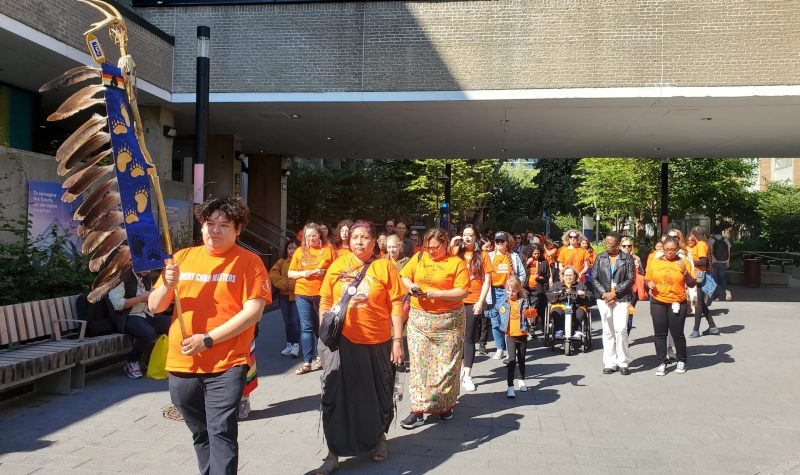Dozens of students, workers and survivors joined together in orange shirts early in the morning to observe and mourn the loss of Indigenous people for the National Day for Truth and Reconciliation.
The Truth and Reconciliation Commission ran from 2008 to 2015 to “provide those directly or indirectly affected by the legacy of the residential schools policy with an opportunity to share their stories and experiences.” With 94 calls to action in the seven years of the commission, action 80 was to have Truth and Reconciliation Day be an observed holiday.
At Toronto Metropolitan University (TMU), the day was observed 24 hours early on Friday, Sept. 29 instead of Saturday, Sept. 30. People gathered in the Student Learning Centre for an opening ceremony and teachings. The teachings were led by Bob Goulais, president of Nbisiing Consulting, who introduced the speakers.
“Truth needs to come before reconciliation. We need to have these kinds of events to allow residential school survivors to speak for our knowledge holders, our elders to share their wisdom to help Canadians,” says Goulais. “This morning is not a day of celebration, it's really a day of solemn observance. It is Very different from National Indigenous Peoples Day in June, where we're celebrating the culture. This today is about understanding what happened to those survivors, thinking about those that have passed on into the spirit world, those those children that were taken.”
The teachings were done throughout the morning. For those who were unable to attend, videos were sent in. Speakers included survivors, direct descendants and TMU staff who all told stories about the importance of the day. One of the speakers was Monica McKay, director of Indigenous directives at TMU, a Nishga woman from British Columbia.
“I often take some time to remember my grandmother, who went to residential school. When I would ask her about her schooling, she would only share with me her regret that she could not go on. She would never talk about what actually happened at the school. And then, when I started to ask my parents, neither of them wanted to talk about their experience,” says McKay.
McKay says that when she was 28, her parents finally talked about their experiences in the residential school system. She says that it took the death of her father’s eldest sister for them to open up; Mckay says that it was the first time she saw her father cry.
“Before he passed, he said ‘I never wanted to talk about what happened to me and I think that was not a good decision on my part.’” says Mckay. “He said ‘always remember the end of those stories. If we don't, they get lost. And they will lose the heart of why it is like we take this day to remember.’”
After the teachings, in the afternoon a flag was raised in honour of the survivors alongside a silent memorial walk. The walk started at Jorgenson Hall and ended in the quad at Kerr Hall. It started at 2 p.m. and ended at 2:15 in honour of the 215 missing children from the unmarked graves discovered in 2021 at the former Kamloops Indian Residential School in BC. Before raising the flag, Rachel Barreca, manager of strategic affairs at TMU, gave a speech to the crowd.
“Many of us are wearing orange today, that is an action we can take because it raises awareness. I encourage you if you don't already know why we're wearing orange, to learn a little [why] the orange shirt is very powerfully symbolic. Let's educate ourselves and our families and our communities and our friends. Truth and Reconciliation is the responsibility of everyone living in this country,” says Baracka.
Listen to the story below:


